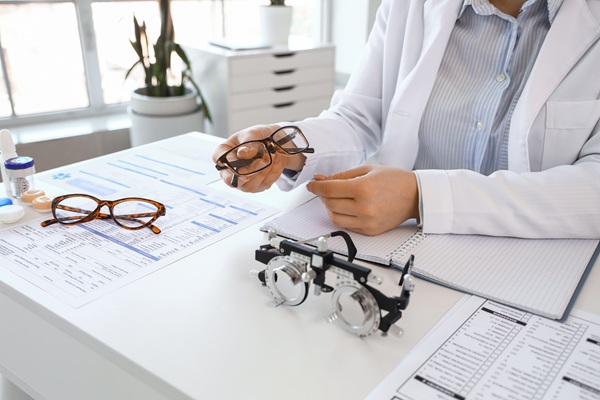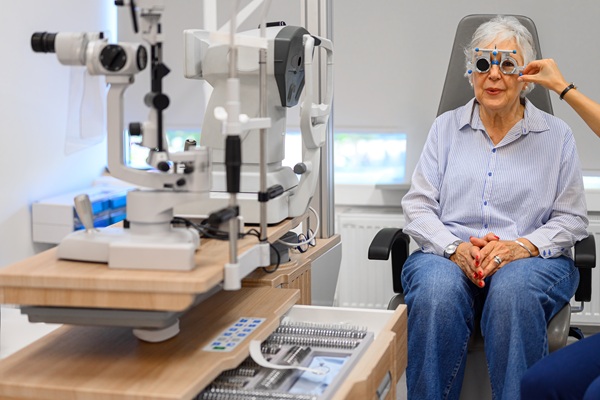Ensuring Proper Care of Your Contact Lenses

Contact lenses correct vision discreetly. However, patients must care for contacts properly to enjoy their benefits. This also helps protect eye health by preventing infection and injury. Fortunately, contact lens care is simple and easy for patients to follow.
Pros and cons of contact lenses
Contacts are a popular alternative to traditional eyeglasses, primarily because they do not bring the appearance changes that come with glasses. They will not fog up or get in the way of recreational activities like sports. In addition, they are ideal for patients who need a strong prescription: The stronger the prescription, the thicker the lenses will need to be for glasses. Contacts can provide the same vision correction without thick glass lenses that alter the face or appearance of the eyes.
That said, contacts have cons like anything else. If stored improperly or not cleaned thoroughly, there is a risk of infection. According to the American Academy of Ophthalmology (AAO), dry, old, or ill-fitting contacts can scratch the eyes. The good news is that proper contact lens care allows patients to reap the benefits of contacts and minimize their risks.
How to take proper care of contact lenses
Contact lens care will vary depending on the type of contacts the patient uses and any existing allergies. Still, there are general care tips everyone with contacts should follow. Explore these tips below.
Always use the rub and rinse method
AAO recommends using the rub and rinse method to clean contact lenses, no matter the type. Before using this method, wash your hands thoroughly. Then, rub the contacts with your fingers before rinsing them with a contact lens cleaning solution. The final step is to soak the contacts in the solution.
Patients should never rinse or store contact lenses with water or homemade saline. Only use the solution recommended by the optometrist. Further, always replace the solution in the contact case. Do not just top it off.
Remember to clean the contact case
To ensure that all the hard work patients do cleaning their contacts is worth it, they should also clean the contact case daily. Just like with the contacts, simply rinse the case with the contact lens cleaning solution. Leave it open so it can air dry. Do not dry it with a towel or even a paper towel; otherwise, it will no longer be sterile. Also, replace the case regularly (about every three months).
Replace contacts as directed
Contact lenses must be changed as directed. Do not use them for longer than intended. Depending on whether the patient is using soft or hard (rigid gas permeable or RGP) contacts, patients may need to replace the contact lenses every day or every 30 days, respectively.
It is common for patients to use contacts only occasionally. If it has been 30 days or longer since the last time they were used, disinfect them again before wearing them.
Do not swim, shower, or sleep with contacts in
Patients should avoid activities like swimming, showering, or sleeping while wearing contact lenses. Always remove contacts before engaging in these activities. Each of these can increase the risk of eye infections. Regarding water-based activities, it is too easy for the water to reach the contacts and infect them with germs. Similarly, sleeping with contacts can dry out the eyes, trap bacteria, and increase infection risk.
Of course, mistakes can happen. Should one accidentally get contacts wet or fall asleep with them in, simply take them out as soon as possible and replace or disinfect them thoroughly. For patients who fell asleep with contacts in and have trouble getting them out, try loosening the contacts with rewetting eye drops. These drops are specifically designed for use with contacts.
Visit the optometrist for routine eye exams
Caring for contact lenses also involves regularly visiting the optometrist for a checkup. This applies even if the patient is satisfied with their current contacts. Most contact prescriptions only last a year to ensure patients keep these crucial appointments, during which the optometrist will check the health of the eye, update the prescription, and more. If the patient is unhappy with their current brand of contacts, the optometrist can recommend an alternative that better suits their needs.
Speak to an optometrist
Consistency is key for proper contact lens care. For personalized advice or to learn more about different types of contact lenses, contact our office for an appointment. Our New Rochelle optometrist can help with your questions and concerns.
Request an appointment here: https://brighteyesny.com or call Bright Eyes Optometry at (914) 730-9574 for an appointment in our New Rochelle office.
Check out what others are saying about our services on Yelp: Contact Lenses in New Rochelle, NY.
Recent Posts
An ophthalmologist visit becomes important when eye symptoms go beyond routine vision changes and signal disease, injury, or sudden shifts that need medical or surgical eye care. An ophthalmologist is a physician who diagnoses and treats eye conditions and performs eye surgery when needed.Many people search "optometrist" when they mean ophthalmologist, and the term often…
Cataract treatment can help you regain clearer vision and improved daily functioning. Professional care from an experienced optometrist offers benefits that can improve your long-term eye health and overall quality of life. The following guide outlines the three major benefits of cataract treatment provided by a trusted, experienced optometrist.During regular appointments with an optometrist, they…
Prescription glasses are an important part of clear vision and eye health. However, if you break or damage your glasses, it is important to act quickly to avoid further problems and restore your sight. Fortunately, taking care of damaged prescription glasses as soon as possible can save you time, money, and discomfort.The first step after…
Dry eye may start with mild irritation, but over time, it can begin to interfere with focus, comfort, and even quality of life. An optometrist can help when this condition becomes more than just a temporary annoyance. There are many potential causes of dry eye, including hormonal changes and seasonal allergies. With tools that reveal…


